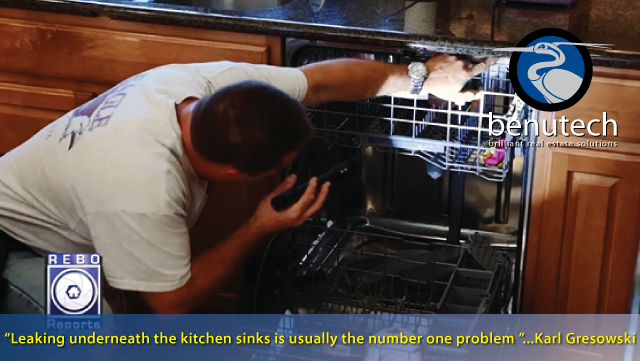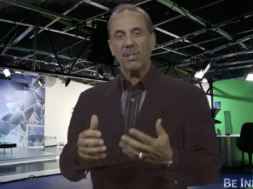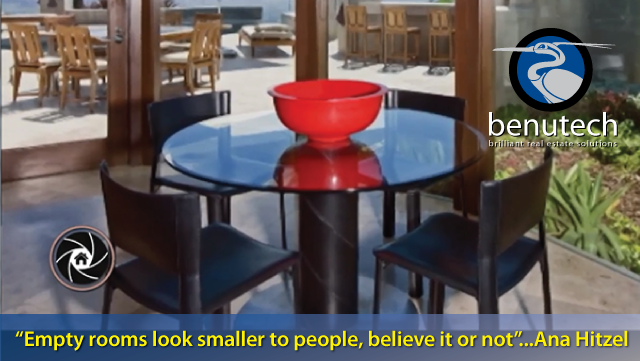The kitchen is one of the most important rooms in the house, both in terms of how it’s used and of how many things can go wrong. It’s important that a home inspector look carefully at the kitchen and its appliances (even if they’re not going with the house, the appliances can signal deeper problems). In this video, our expert inspector, Karl Gresowski with Eagle Home Inspections, takes us through the nuances of kitchen inspection.
After watching this video, you may be reassured about your own home, or you may already be making a repair to-do list, but even if you’re already an expert inspector, you’ll probably learn something.
KARL GRESOWSKI: Well, what we’re doing is we’re coming through and checking the appliances, running the dishwasher, making sure we have no corrosion underneath there, that it’s draining properly through the air gap, and also it’s not leaking. As far as the oven and stoves, we want to make sure they’re secured to the cabinets so we have no movement. Make sure the flames are coming up and that we have the gas regulators built into them too. So that way we have the proper amount of flames coming out. As far as the kitchen sink, we want to run it, and we want to run it for a little while, make sure there’s no leaking, make sure there’s no mildew or moisture stains, because, again, that could cause a problem.
IOVENITTI: You had mentioned also about the seals inside of the oven area. Something that most people kind of overlook that you tend to take really seriously.
GRESOWSKI: Yes, what happens is I’ll run them. I’ll put them on bake, make sure the convection fans are running, and then as they’re running, we’re going to go by, make sure the doors are sealed so we don’t have any excess of heat coming out. Check the door gaps, make sure it’s sealing properly.
IOVENITTI: I see. How about the cabinets. Do you check the cabinets out, and the glides, and the doors?
GRESOWSKI: Yes. All of them are opened up, and checked. Apparently that’s sealed. And make sure the door glides are in there. We want to make sure the bottoms are not falling out. Because a lot of people overstack them so things are falling through.
IOVENITTI: I see.
GRESOWSKI: And make sure the face is not getting pulled out from mistreatment. And then look underneath for anything else that may be there, such as improper wiring, maybe we had a past water leak that may give us some indication that it leaked for a while and may have a little moisture damage or mildew.
IOVENITTI: You mentioned that refrigerators are probably not in the scope of your inspection.
GRESOWSKI: No, they’re not.
IOVENITTI: And the reason why?
GRESOWSKI: Because most of them are not sold with the house. They leave with the house. The main concern is, if the refrigerator is on good wheels, and we can slide it out, we want to look at the back water connection. Because 90% of the time I find the little water’s dripping a little bit, we get a little bit of moisture at that back valve.
IOVENITTI: I see.
GRESOWSKI: So I do like to check that.
IOVENITTI: So that valve is kind of connected to the plumbing under the sink, correct?
GRESOWSKI: Yeah. It actually has its own supply line in the back that allows water for the water and ice in the refrigerator.
IOVENITTI: Does there need to be certain venting in the back of a refrigerator that you should be concerned about?
GRESOWSKI: No, we want to make sure there is circulation, so it can breathe properly and it doesn’t overheat. But that depends on each refrigerator and how it’s built.
IOVENITTI: I see. So, if they’re built into a cabinet, would that be something you would look at?
GRESOWSKI: No, not really, because the refrigerator goes out. The subzeros always have the refrigeration on top that have their own ventilation. These ones here, usually the ventilation’s on the bottom, so it can breathe out and has its own fans.
IOVENITTI: So, you check to make sure that the right GFI plugs are around the water areas, and that the windows are sealed up… How about the dishwasher? You said earlier that some of the things that are eliminated are when the installation, some of the installers forget to actually mount the dishwashers.
GRESOWSKI: Yeah, they forget to secure it to the cabinet, so then it gets moved around. And any time it can get moved around, we can cause the plumbing underneath to come loose, or bend a little bit, kink, and cause a leak. So we want to make sure that it’s secure to the cabinets.
IOVENITTI: I see. Is there anything else? You mentioned also that you may be able to tell if the granite is sealed, is that correct?
GRESOWSKI: Usually, as you can see here, it’s pretty shiny, so we know this one’s been sealed. We should seal them every year just to make sure that we’re not getting our staining when we’re putting water on there and it’s seeping in to it. We want to try to eliminate that stuff. Again, that’s up to each individual homeowner.
IOVENITTI: You know, you’re one of the few inspectors that’s ever told me anything about granite being sealed and how it has to be done every year in order to eliminate those stains. How about the backsplashes, if they’re removed from the wall, do you check to see if all that’s done as well?
GRESOWSKI: As far as the backsplash, we want to make sure that there’s no gaps in them, make sure they’re caulked and they’re sealed. We don’t want any type of moisture penetration behind it from people washing their hands or washing dishes with the spray wand.
IOVENITTI: What would you say is the number one item that you find in a kitchen?
GRESOWSKI: Leaking underneath the kitchen sinks is usually the number one. We have leaks underneath there, which cause mildew. 90% of the time we’ll actually find where the bottom shelf has been damaged, so it ends up needing to be replaced – and that’s usually in the termite report too.
IOVENITTI: So that would be something of dryrot?
GRESOWSKI: Yeah. Dry rot. Exactly.
IOVENITTI: Dry rot. Ok, is there anything else in the kitchen that we need to be explained about or something you could tell us about?
GRESOWSKI: On our vent hoot fans, the older models used to recirculate, recirculate them into the kitchen. All new homes are basically vented to the outside. So we always want to make sure that our vents have our ducting up here, and it’s vented to the outside. So we do want to run our fan, make sure we’re not leaking any air. Because you’ve got to remember, you’re cooking, grease is getting up in there. We don’t want that to be unsealed, because all of a sudden we have grease there. So if we do have a fire, that spreads up there and is even harder to put out.
IOVENITTI: I see. Well, that’s fantastic. So, from the electrical through the plumbing, through the appliances. How about the flooring, since there’s a lot of tile and marble and things that are laid out on the floor? Can you tell if there’s any movement in the foundation from that?
GRESOWSKI: Usually, if we have cracks in the tiles, that gives a little indication. This one here is sealed pretty well. I don’t see any cracked grout, nothing’s mis-aligned, which is pretty nice. Sometimes we do get, in the older homes, where you can actually see the horizontal and vertical cracks through it, which tells us there’s a slab crack somewhere, and we should probably look at it.
IOVENITTI: You know, you made an interesting comment when we walked in, about being an inspector and working on behalf of buyers and sellers and real estate agents. That in a lot of cases, that people would rather you find nothing wrong with the house.
GRESOWSKI: Yes, because some agents would rather not have their deal go south. With a good inspector, he should be able to tell the buyer what’s wrong, what needs to be fixed, and explain it to them… Ok, our outlet’s bad, we do need to change that GFI. It’s only a $15 part at Home Depot. Plus whatever the local electrician charges to install it.
IOVENITTI: I see.
GRESOWSKI: So if an inspector knows these things, can help the buyer and explain them properly and not scare him, the deal should not fall through.
IOVENITTI: So, after an inspection, would you meet with the buyer personally, if the buyer was not here?
GRESOWSKI: Well, what I tell my buyers is: if they cannot make it, because some of them are out of state purchasing and moving into the state, I give them my email and my phone, tell them to go through the report, highlight what’s important to them, call me in the evening, and we will sit down and go through any questions they have.
IOVENITTI: For the most case, it’s just simple things.
GRESOWSKI: Usually just simple things.
IOVENITTI: All right. Well, thank you, Karl, for the kitchen. We’re going to move on to the next room. Stay tuned.



















Hello there! I simply wish to give you a big thumbs up
for your great info you have here on this post. I am coming back to your website
for more soon.